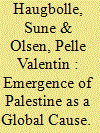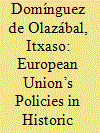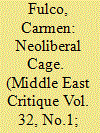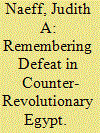|
|
|
Sort Order |
|
|
|
Items / Page
|
|
|
|
|
|
|
| Srl | Item |
| 1 |
ID:
191925


|
|
|
|
|
| Summary/Abstract |
In the late 1960s, Palestine became an iconic signifier of solidarity and support for the Left, but also a transgressive tool that shaped and re-situated ideological positions at domestic levels. In this article, we attempt to answer why, how, and when this happened. Most research to date has stressed the global diplomatic offensive by the PLO (Palestine Liberation Organization). Palestinian revolutionary thought and action are obviously the primary explanatory factors for the emergence of their cause internationally. However, a one-sided approach blurs the agency of the global revolutionaries and solidarity activists who helped elevate Palestine to a global cause. This article takes a comparative approach and uses Denmark and Norway as two illustrative examples of Palestine’s transformation into a global leftist cause. Denmark and Norway are central cases because solidarity movements in Scandinavia developed early on, and because they exemplify how Fatah, in Norway, and the Popular Front for the Liberation of Palestine (PFLP), in Denmark, advanced different models of solidarity and cultural diplomacy. We compare these two cases with new evidence from other countries in order to summarize how a cultural transfer of symbols, interpretations, experiences, and ideological positioning took place in the 1960s and 1970s through meetings, translations, and organizational links.
|
|
|
|
|
|
|
|
|
|
|
|
|
|
|
|
| 2 |
ID:
191919


|
|
|
|
|
| Summary/Abstract |
Most analyses of European Union (EU) policies relating to the Israeli-Palestinian conflict do not question the epistemological framework on which these policies are based. The 1967 paradigm preferred by the EU does not address the inalienable rights of all Palestinians but rather focuses exclusively on a particular group, those Palestinians living in the Gaza Strip and the West Bank, territories that have been under Israeli occupation since 1967. This focus ignores (or at most leaves in a second place) the rest of the Palestinian people: both 1948 Palestinians and the Palestinian diaspora, whose rights are part and parcel of the question of Palestine. This article examines how the EU bases its policies on different kinds of securitisation concerning distinct Palestinian communities. It does so through a two-step securitisation process that frequently rubber-stamps Israel’s narrative of securitisation. This compartmentalising program ultimately is complicit with Israel’s ‘divide and rule’ strategy and settler-colonial mechanisms, contributing to the deepening of Palestinian fragmentation. Moreover, it renounces exploring alternative proposals and paradigms that consider the rights of the Palestinian people as a whole and envisages decolonisation as the desired outcome.
|
|
|
|
|
|
|
|
|
|
|
|
|
|
|
|
| 3 |
ID:
191922


|
|
|
|
|
| Summary/Abstract |
This article examines the intergenerational transmission of social movement activism in Bahrain, with a focus on the human rights movement and al-Khawaja family. The research argues that intergenerational transmission and the inheritance of capital, in a family setting, is a vital resource for the local and transnational movement. Specifically, the research investigates multiple generations of activists from the same families to unearth the effects of activism running across the various generations. In alignment with a growing trend in social movement scholarship, the article seeks a better understanding of the effects that authoritarian conditions have on social movements. The research uses a Bourdeusian analytical framework and is based upon sixteen interviews with three different generations of Bahraini human rights activists, retrieving their biographical trajectories. By approaching the intergenerational transmission of social movement activism and the inheritance of capital as constitutive of activists’ radical habitus, this paper demonstrates that the family is a crucial resource for social movements acting within the repressive circumstances of an authoritarian state.
|
|
|
|
|
|
|
|
|
|
|
|
|
|
|
|
| 4 |
ID:
191924


|
|
|
|
|
| Summary/Abstract |
No one disputes the authenticity of the Islamic Revolution of 1979 that led to the overthrow of the Pahlavi regime and left its footprint in the region and the world at large. This research is an attempt to revisit the Islamic Revolution from an entirely new perspective, looking at the fall of the Pahlavi regime from a combined modified J-Curve Theory of James Davis and Abraham Maslow’s theory of human needs. These combined theories are applied to the socio-economic conditions that lead to the fall of the Pahlavi regime in 1979. The article aims to determine the socioeconomic variants within the general framework and limitations of the J-Curve and to modify the theory to further explain the more ambiguous aspects that fall beyond the socioeconomic components, those defined as the ‘self-actualization needs,’ in what Maslow describes as the basic self-fulfillment aspirations of human beings. The study has several major objectives. Foremost it concentrates on a review of the socioeconomic bottlenecks during the last fifteen years prior to the Islamic Revolution of 1979. Observers regard these as the years of economic and social growth and prosperity. However, these years also led the country to the brink of collapse and revolution. The study seeks to analyze the socio-economic boom and bust in Iran’s development and the rapid decline during the final years prior to the fall of the Pahlavi regime. The attempt is to try and understand the reasons behind the bottlenecks and failures of many of the policies adopted by the regime and to test the validity of the J-Curve theory. The study also looks beyond Davies’ theory of revolution and argues that the J-Curve cannot respond to higher levels of human needs, particularly the self-actualization needs proposed by Maslow. To resolve this issue, we expand the J-Curve theory to include other paradigms as it became necessary to modify the J-Curve to suit the case. Evidence shows that the Shah promised more than he delivered, which led to his ultimate fall because his promise of a ‘Great Civilization’ could not be realized.
|
|
|
|
|
|
|
|
|
|
|
|
|
|
|
|
| 5 |
ID:
191920


|
|
|
|
|
| Summary/Abstract |
On the occasion of Tunisia’s 2019 legislative and presidential elections, politics witnessed the proliferation of distinct varieties of populism that culminated in the electoral victory of the current president, Kais Saied. This article argues that the Kais Saied phenomenon inscribes into a Tunisian ‘populist moment’ that found fertile terrain in the protraction of the socioeconomic crisis and the absence of a radical critique of the neoliberal order. Although Kais Saied proposed an alternative to traditional politics in his electoral campaign, he did not seem likely to shake the foundations on which Tunisia’s neoliberal cage has been built. Rather, an empirical analysis of the context of his ascent suggests that populism à la Kais Saied surfaced as the by-product of an unquestioned neoliberal order, reinforced by the political elite of the post-Arab Uprisings period.
|
|
|
|
|
|
|
|
|
|
|
|
|
|
|
|
| 6 |
ID:
191921


|
|
|
|
|
| Summary/Abstract |
This article analyses how a creative writing workshop in 2017 Cairo dynamically engaged with cultural memories of the 1967 defeat of the Arab armies. The article first situates 1967 as a crucial reference point in discursive attempts to tie personal life stories to national history and in making sense of a widespread feeling of postcolonial disenchantment. It is in the ruinous aftermath of the 2011 uprisings, when a view on a political horizon beyond the stifling present temporarily was reopened, that the workshop critically examined the relations between cultural memory, family history, and everyday life with, at its center, the notion of defeat in all its shapes and intensities. The article argues that the workshop can be seen as ‘an intimate public,’ carving out a space for survival lying largely outside of the sphere of politics. Nevertheless, in its affective plurality that stimulated modes of irreverence, the workshop tentatively opened up new political dispositions under the strenuous conditions of post-2013 Egypt.
|
|
|
|
|
|
|
|
|
|
|
|
|
|
|
|
| 7 |
ID:
191923


|
|
|
|
|
| Summary/Abstract |
Populism, as a mode of political logic, always has been a significant factor within Turkey’s political landscape, and it strongly is associated with right-wing political parties. The AKP’s conservative democratic populism and neo-right-wing mission arose as a sui generis governmental orientation out of the organic crisis of the Kemalist regime by articulating the collective political passion and the common affects it engenders in the populace. This article argues that right-wing populism developed as a transformative politics embracing neoliberal economics that subverted the anti-status quo through a counter-hegemonic discourse and electoral strategy. The AKP’s empty signifier is an example of radical negativity with its antagonistic division between a hegemonic power bloc (corrupt elites) and an excluded underdog (pure people). However, within a post-democracy conjuncture, the AKP adopted a new radical right-wing populism based on a Turkish-Islamic synthesis. The party’s electoral hegemony is crumbling and ruptured by an authoritarian and illiberal politics that has created a post-hegemonic populist moment.
|
|
|
|
|
|
|
|
|
|
|
|
|
|
|
|
|
|
|
|
|